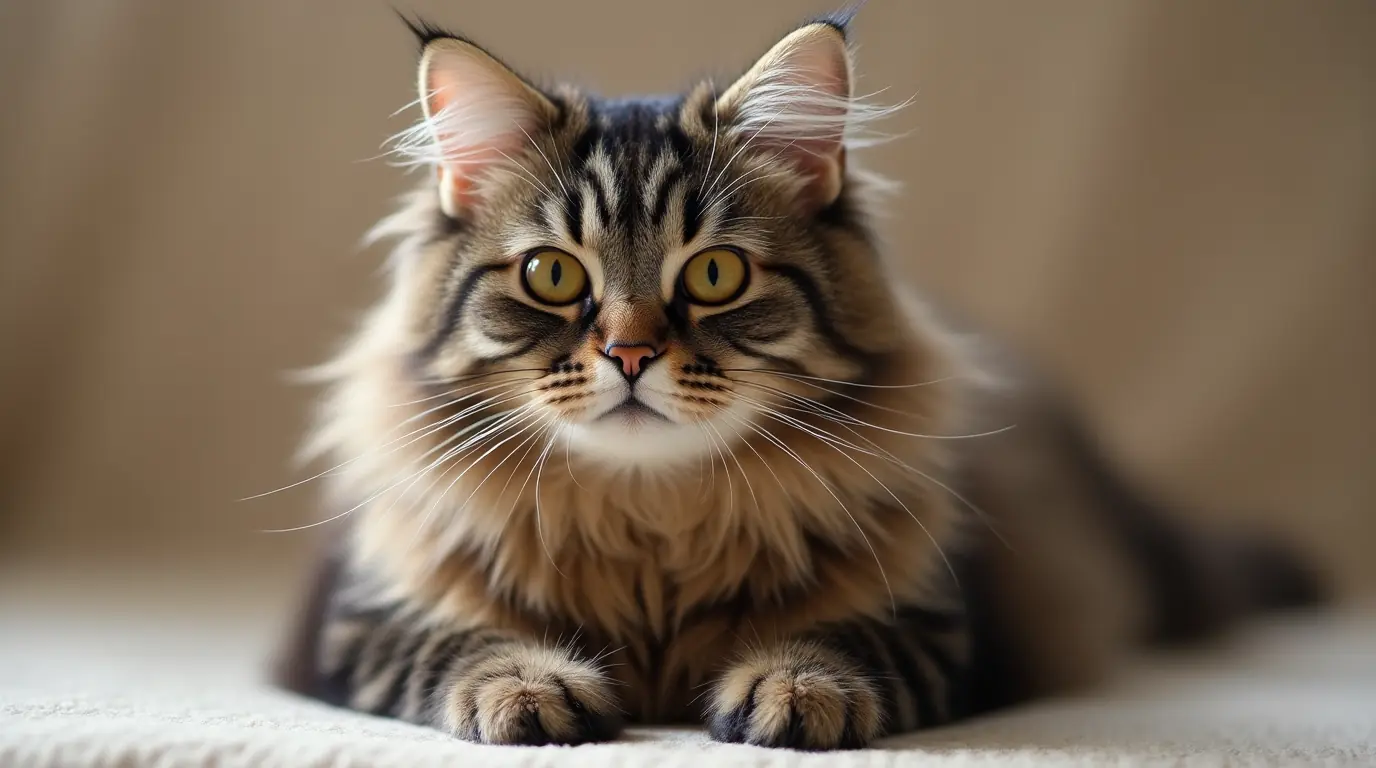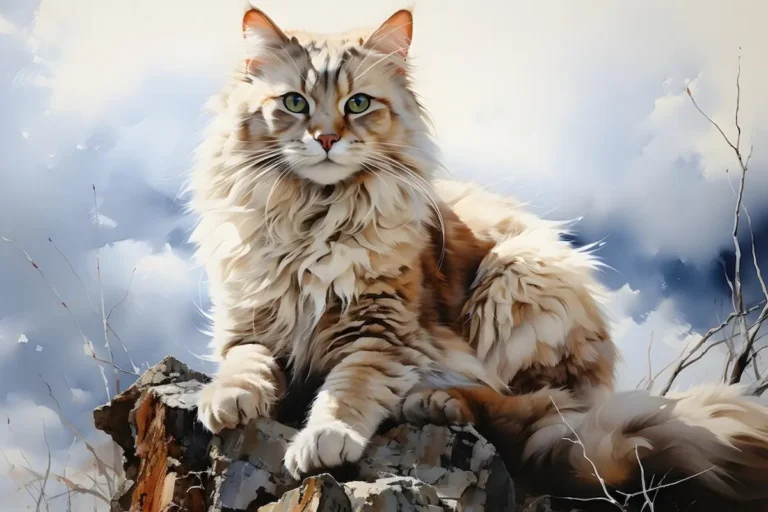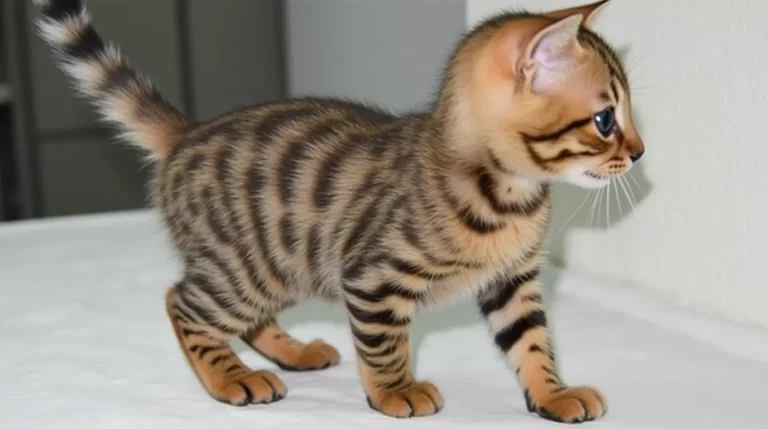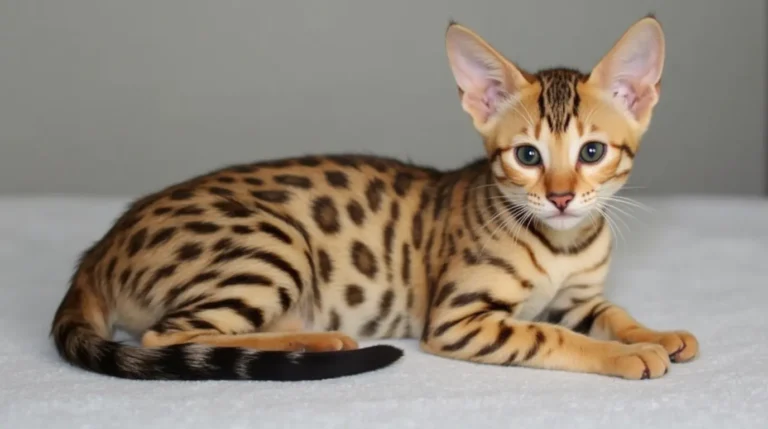British Longhair Kittens for Sale: 5 Reasons Why They Make the Perfect Pet
Looking for British Longhair Kittens for Sale? Discover why these incredibly affectionate, laid-back cats, also known as Lowlanders in the US and Britannica in Europe, could be the perfect addition to your home. With their luxurious medium-length coat and gentle temperament, British Longhair kittens combine the best qualities of both British Shorthairs and Persians. This rare and unique breed is the hidden gem you’ve been searching for!
So, why are British Longhair kittens the perfect pet? They are calm, affectionate, and love people. Let’s explore the top 5 reasons why they should be on your list as you search for the perfect pet.
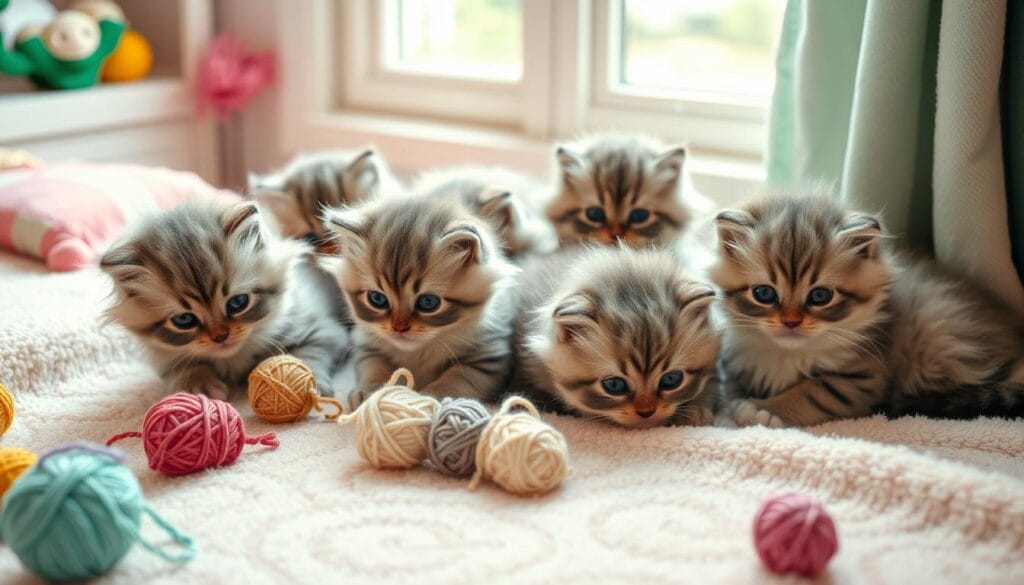
Key Takeaways
- British Longhair kittens are a unique variant of the British Shorthair with a medium-length coat.
- Despite their popularity, they remain unrecognized as a separate breed in the UK.
- These cats are known for their calm, affectionate, and people-oriented temperament.
- British Longhair kittens make delightful companions for a variety of households.
- Explore the top 5 reasons why these felines are the perfect pet choice.
Understanding the British Longhair Breed Heritage
The British Longhair is a captivating feline breed with roots in the iconic British Shorthair. It was created through selective breeding. This mix combines the British Shorthair’s sturdy build and loving nature with the long, plush coat of breeds like the Turkish Angora and Persian.
Origins and Development
The British Longhair’s origins date back to the latter half of the 20th century. Breeders aimed to create a cat with the British Shorthair’s qualities but with a longer, more luxurious coat. Through crossbreeding, the British Longhair was developed. It kept the British Shorthair’s muscular physique and gentle personality.
Historical Significance
The British Longhair may not be as well-known as the British Shorthair. Yet, it’s gaining popularity among pet owners. This breed is winning hearts with its stunning looks and loving nature.
Breed Recognition Status
The British Longhair’s journey to recognition is ongoing. Cat registries and associations are working to establish its place. Despite not being as famous as the British Shorthair, it’s gaining fans who love its regal beauty and affectionate nature.
Related: British Longhair Cat: 5 Reasons This Rare And Majestic Breed Is Perfect For You
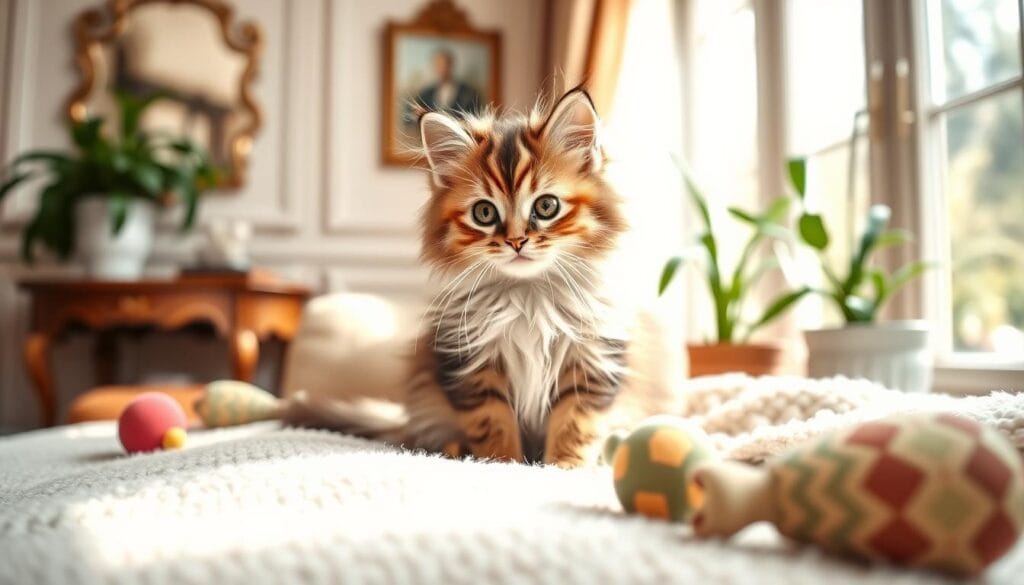
“The British Longhair is a truly remarkable breed, blending the best qualities of the British Shorthair with a lush, flowing coat that commands attention.”
Physical Characteristics of British Longhair Cats
Are you thinking about getting a long-haired cat? The British Longhair might be just what you’re looking for. These cats have beautiful, thick coats in many colors and patterns. They really stand out.
British Longhairs look a lot like their shorter-haired cousins, the British Shorthairs. They have strong bodies, round faces, and big, expressive eyes. Their medium-length fur is soft and fluffy, feeling like velvet.
Their coats come in a wide range of colors, from deep blacks to light lilacs and chocolates. Some have cool tabby or bicolor patterns. No matter the color or pattern, they look regal and stunning.
It’s important to groom a British Longhair regularly. Their semi-long fur needs brushing to stay healthy and look good. With the right care, their coats will shine.
If you’re interested in how rare is a British longhair cat or just love the idea of long-haired kittens for sale, the British Longhair is a great choice. They are sure to charm and delight you.
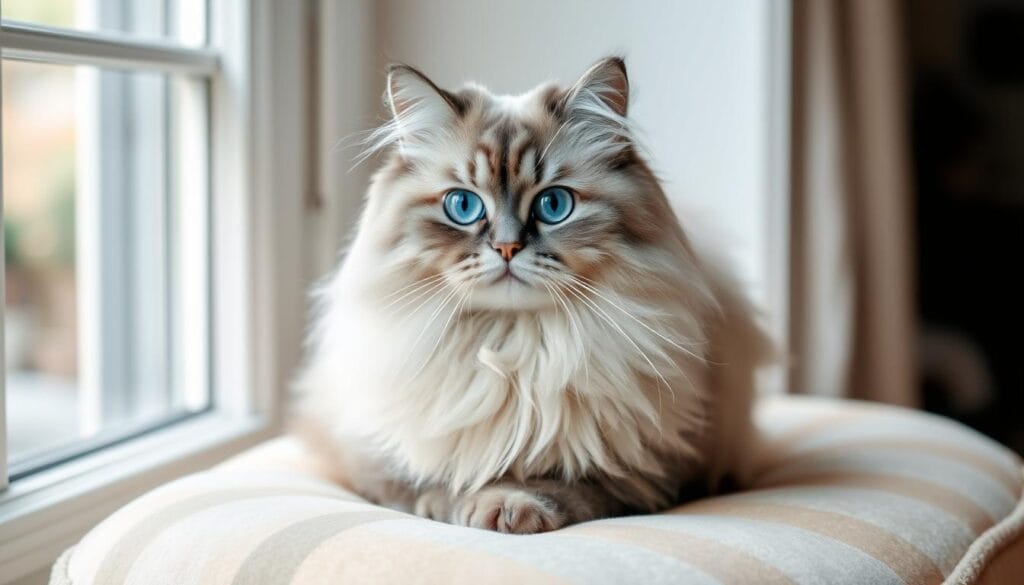
The Distinctive Personality Traits
Thinking of getting a British Longhair kitten? You’ll love their sweet and calm nature. They mix the British Shorthair’s calmness with the Persian’s nobility. These cats are great friends for many homes and lifestyles.
Temperament Overview
British Longhairs are known for being balanced and loving. They are calm and gentle, making them great housemates. They love attention but don’t need it all the time, perfect for busy people.
Social Behavior
British Longhair kittens are independent but love people. They bond strongly with their owners and get along with kids and pets. They’re playful and laid-back, fitting well into many homes.
Adaptation to Family Life
British Longhairs are very adaptable. They do well in big homes or small apartments. Their calm and gentle nature makes them perfect for families, seniors, and pet owners. With love and care, they’ll fit right into your home.
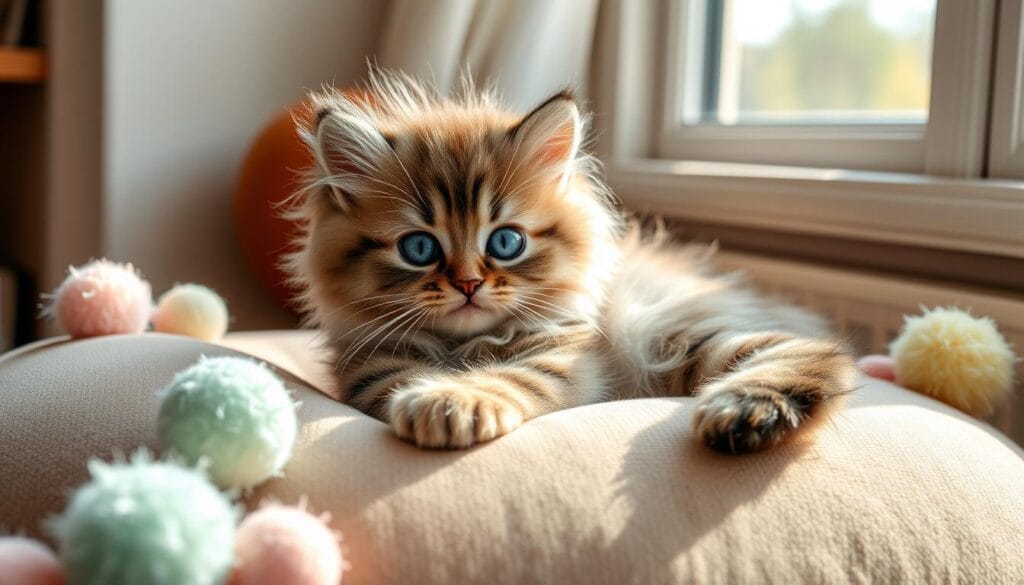
“The British Longhair is the perfect blend of regal poise and affectionate companionship. Their tranquil nature and adaptability make them a delightful addition to any family.”
| Personality Trait | Description |
|---|---|
| Temperament | Balanced, affectionate, and calm |
| Social Behavior | Enjoys attention but doesn’t require constant interaction, good with children and other pets |
| Adaptation to Family Life | Versatile and thrives in various living situations, including apartments and spacious homes |
Looking for a loyal domestic longhair kitten or a perfect pet? The British Longhair is a great pick. Their friendly and adaptable nature will win your heart and brighten your home.
Health and Lifespan Considerations
British Longhair cats are generally healthy but can face certain health issues. These include Hypertrophic Cardiomyopathy (HCM) and Polycystic Kidney Disease (PKD). Regular vet visits are key to catching and treating these problems early.
These cats might also get fat if they don’t get enough exercise or eat the right food. With proper care, they can live between 12 to 16 years.
Studies show cats usually live about 12 years. Some can live up to 20 years. Crossbreed cats tend to live longer than purebreds, with an average of 14 years compared to 12.5 for purebreds.
| Breed | Average Lifespan | Common Health Concerns |
|---|---|---|
| British Longhair | 12-16 years | Hypertrophic Cardiomyopathy (HCM), Polycystic Kidney Disease (PKD), Obesity |
| Birman | 12-16 years | Hypertrophic Cardiomyopathy (HCM), Polycystic Kidney Disease (PKD) |
| Burmese | 12-16 years | Hepatic Lipidosis, Diabetes, Respiratory Issues |
| Siamese | 12-15 years | Amyloidosis, Diabetes, Respiratory Issues |
| Persian | 10-15 years | Polycystic Kidney Disease (PKD), Respiratory Issues, Eye Problems |
Remember, a cat’s lifespan and health can change based on many factors. These include their genes, diet, exercise, and overall health. Keeping up with vet visits and caring for their health is vital to ensure they stay are British longhair cats healthy and how much a British longhair black for their whole life.
British Longhair Kittens for Sale: What to Expect
Looking for British Longhair kittens means you’ll likely spend a bit more. These cats are not common, which makes them more expensive. The average price for a British Longhair kitten can be between $1,000 and $2,500. This price varies based on the kitten’s lineage, color, and the breeder’s standing.
When you’re looking for a British Longhair kitten, start by finding good breeders in your area. It’s a good idea to see the kitten and its parents. This can help you understand the kitten’s personality and where it lives. Also, make sure the breeder gives you all the health records and papers you need.
- Expect to pay between $1,000 and $2,500 for a British Longhair kitten
- Research reputable local breeders and visit the kitten and its parents, if possible
- Obtain all required documentation, including health certificates and vaccination records
Knowing the cost and what to expect can help you decide to bring a British Longhair into your home. These cats are loved for their loving nature and elegant look. They’re a favorite among cat lovers.
Essential Care Requirements
Owning a British Longhair cat means you need to take care of their long, beautiful fur. These cats are known for their elegant look. They need regular grooming to avoid matting and keep their fur looking great.
Brush your British Longhair 2-3 times a week to keep their coat healthy and shiny. Brushing removes loose hair and spreads skin oils. It also helps prevent hairballs. You should bathe them every 6-8 weeks to keep their coat clean and free of tangles.
British Longhairs also need their nails trimmed every 2-3 weeks. This keeps their paws healthy. Don’t forget to take care of their teeth by brushing or giving dental chews to prevent dental problems.
They need a diet rich in protein to keep their coat plush and healthy. Avoid overfeeding to prevent obesity, which can cause health issues. Make sure they have a calm place to rest, scratching posts, and toys for fun and exercise.
By following these care tips, your British Longhair cat will be happy and healthy. With the right care, they will bring joy to your home for years.
Grooming Tips and Maintenance
British Longhair cats have beautiful, long coats that need careful grooming. They require more attention than short-haired cats but with the right methods, they’ll stay healthy and look great.
Brushing Techniques
Brush your British Longhair’s coat 2-3 times a week. Use a wide-toothed comb or slicker brush. This keeps their coat shiny, removes loose hair, and prevents tangles. You might need to brush more often during shedding seasons.
Bathing Guidelines
Bathing is not often needed for British Longhairs. They usually groom themselves well. But, if they get very dirty or matted, a gentle wash with cat-specific shampoo is okay. Make sure to rinse well and dry them completely to avoid skin problems.
Professional Grooming Needs
Regular brushing at home is key, but professional grooming is also good. A groomer can do deep de-shedding, trim mats, and keep your cat’s coat perfect. It also strengthens your bond with your cat.
Grooming is vital for British Longhairs to keep their coats soft and healthy. By brushing at home and getting professional grooming, you’ll ensure your long-haired kittens for sale or domestic long hair kittens look their best.
Diet and Nutrition Guidelines
Keeping your British longhair cat healthy means giving them the right food. They need a diet that’s balanced and high-quality. The amount of food your British longhair kitten needs can change as they grows and gets more active.
Choose cat food that’s rich in protein from animals, has the right amount of fat, and does not have too many carbs. Mixing wet and dry food helps keep your British Longhair hydrated. Some owners pick special foods to help their cat’s coat, with omega-3 and omega-6 fatty acids.
It’s important to control how much food your British Longhair gets. They can easily get too fat because they like to relax. Talk to your vet to figure out how much and when to feed your cat based on their age, size, and how active they are.
| Nutrient | Recommended Levels for British Longhairs |
|---|---|
| Protein | Minimum of 30% on a dry matter basis |
| Fat | 18-30% on a dry matter basis |
| Carbohydrates | Less than 35% on a dry matter basis |
| Fiber | 3-5% on a dry matter basis |
| Moisture | Minimum of 70% for wet foods |
Feeding your British longhair cat a nutritious diet is key. It helps them stay healthy, live longer, and keep that stunning coat that makes them so special.
Exercise and Activity Needs
British Longhair cats look plush but need moderate exercise. They love short, energetic play sessions. Regular play helps keep them healthy and prevents obesity.
Play Requirements
Interactive toys are key for your British Longhair. Wand toys, laser pointers, puzzle feeders, and climbing structures keep them entertained. These toys satisfy their natural hunting and exploring instincts.
Environmental Enrichment
Creating a stimulating environment is vital for your domestic long hair kitten. Add window perches, cat trees, and vertical structures. These allow them to climb and watch the world.
Exercise Equipment
- Scratching posts and pads for healthy nails
- Interactive puzzle feeders for mental stimulation
- Automated toys for chasing and pouncing
- Harnesses and leashes for outdoor fun
With a balanced exercise plan and a stimulating environment, your British Longhair will stay happy and healthy. They’ll enjoy their time with you.
Living Space Requirements
British Longhair cats are adaptable to different living spaces. They are happy in both big homes and small apartments. What matters most is a calm, comfy place with lots of chances to relax and play.
Make sure your British Longhair has cozy spots to rest, like soft beds or cat trees. Scratching posts are key for their claw health and natural behavior. Also, consider adding window perches or cat shelves for them to watch the outside world.
Even though they don’t need a lot of space, they should have room to move and play. A well-designed home with plenty of toys and activities will make your British Longhair very happy.
| Recommended Living Space for British Longhair Cats | Minimum Requirements |
|---|---|
| Spacious homes with multiple levels | At least 200 square feet of open floor space |
| Apartments or smaller residences | At least 150 square feet of open floor space |
| Vertical space with cat trees and perches | At least 6 feet of vertical clearance |
For a happy British Longhair, focus on a calm, comfy, and fun living space. Meeting their basic needs and letting them play will make them thrive in your care.
Training and Socialization Tips
British Longhair kittens are smart and love to please. They respond well to training and socialization. With patience and positive feedback, your British longhair kitten will grow into a well-behaved friend.
Training Techniques
Clicker training works great for British Longhairs. The click sound tells them exactly when they did something right. Add tasty treats, and they’ll learn fast. Start early and keep training short to keep them interested.
Litter Box and Scratch Post Training
Training for the litter box and scratch posts needs patience and consistency. Create a routine and guide your kitten to the litter box after meals and naps. Make scratch posts appealing to stop furniture damage.
Socialization
- Introduce your kitten to many people, pets, and places early.
- Positive experiences help your kitten grow into a confident adult.
- Gradually introduce new things and reward calm behavior.
Right training and socialization make your British longhair personality shine. Consistent, positive training and early exposure to new things are crucial. This way, your British Longhair kitten will be a loving family member.
Common Health Issues and Prevention
British Longhair cats can face certain health issues. It’s important to watch for these and take steps to prevent them. This helps your cat live a happy and healthy life.
Genetic Conditions
Two main health problems for British Longhairs are Hypertrophic Cardiomyopathy (HCM) and Polycystic Kidney Disease (PKD). HCM affects the heart and can lead to failure. PKD damages the kidneys over time. Early detection through vet visits and tests is key to managing these conditions.
Preventive Care
Keeping your British Longhair healthy involves a few steps. A good diet and regular exercise are essential. They help maintain their beautiful coat and keep them energetic.
Playing with your cat and giving them plenty of exercise keeps them physically and mentally sharp. This is important for their overall health.
Regular Health Checkups
Regular vet visits are vital for catching health problems early. Your vet can check your cat’s health, run tests, and advise on dental care. This proactive approach helps your cat stay healthy for years.
By knowing about health issues, taking preventive steps, and visiting the vet regularly, you can ensure you are a British longhair cats healthy. Remember, the cost of a British longhair black cat is less important than their health and happiness.
“Regular check-ups and preventive care are the keys to maintaining the health and longevity of your British Longhair cat.”
Conclusion
The British longhair kittens for sale are a mix of beauty, love, and calmness. They make great pets for many homes. Their soft fur, calm nature, and ability to adapt are why they’re so popular.
They need regular grooming and health checks. But the happiness and friendship they offer are worth it. They’re perfect for those who want a calm yet loving cat.
If you want a long haired kittens or a new cat friend, the British longhair kittens for sale are a great choice. They have a unique look and a loving personality. Knowing about their history looks, and care needs will help you enjoy a happy life with your British longhair cat.
The British longhair kittens for sale are a wonderful choice for cat lovers. Their beauty, love, and calmness show why this breed is so loved. They promise to be a loving friend for many years.
FAQ
How much is a British Longhair kitten?
The price of a British Longhair kitten varies a lot. It depends on things like the kitten’s pedigree, color, and the reputation of the breeder. Because they are not very common, you can expect to pay a higher price.
What is the price of a British Longhair cat?
The cost of a British Longhair cat can range from a few hundred to several thousand dollars. This price change is due to the same factors that affect kitten prices, like pedigree, color, and breeder reputation.
How rare is a British Longhair cat?
British Longhairs are less known than their shorthaired friends, the British Shorthairs. They are still quite rare, especially in the UK where they are not officially recognized as a breed.
How much is a British Longhair black?
The price of a British Longhair, including black ones, can vary a lot. It depends on things like pedigree, breeder reputation, and demand. Some buyers might want a black British Longhair more, which could make the price go up.
Are British Longhair cats healthy?
British Longhairs are usually healthy cats. But, like any breed, they can get some genetic diseases. Hypertrophic Cardiomyopathy (HCM) and Polycystic Kidney Disease (PKD) are examples. It’s important to take them to the vet regularly and keep them healthy.
What is the most expensive cat?
The most expensive cat breeds can change, but some top ones include the Savannah cat. It can cost thousands of dollars. Also, rare breeds like the Khao Manee and the Savannah are very pricey. But, the British Longhair is not among the most expensive.

